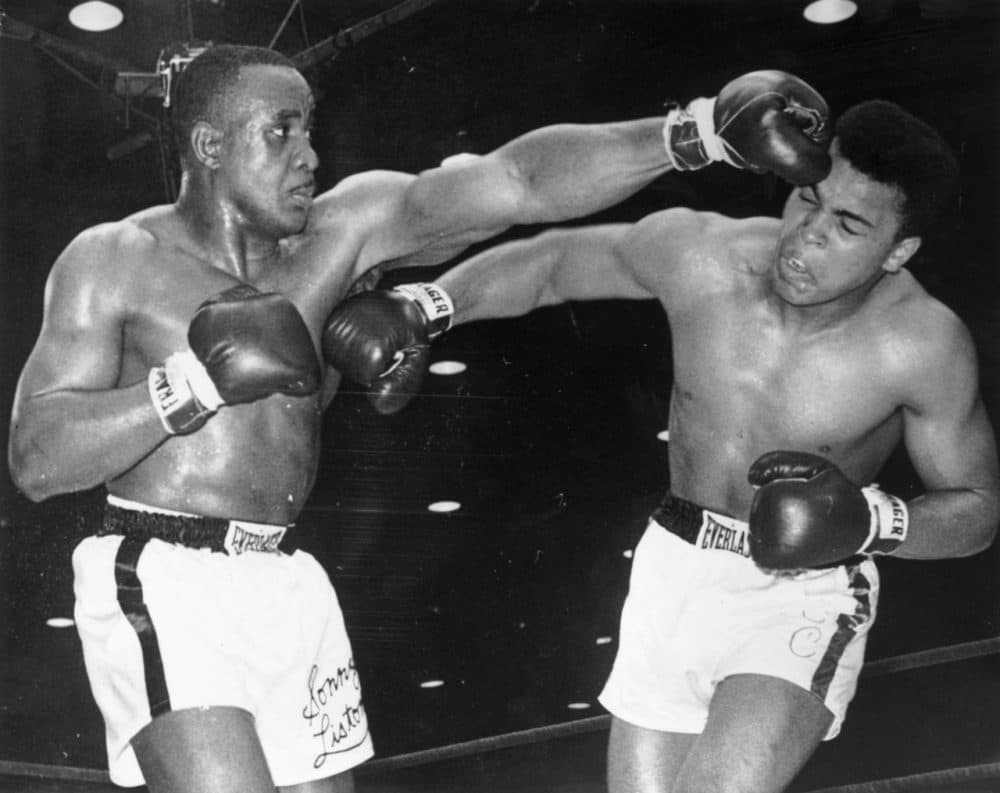Advertisement
The State Of Boxing 50 Years After Clay vs. Liston
Resume
Just over 50 years ago, on February 25, 1964, a slender, young, not-quite-heavyweight with a big mouth beat Sonny Liston. Nobody was supposed to be able to do that. The new champion's name was Cassius Clay, but not for long. Shortly after becoming the Heavyweight Champion of the World, Clay became Muhammad Ali. According to veteran Boston Herald boxing writer Ron Borges, even before doing that, the new champ had appealed to at least one young sports fan and irritated an older one.
“I can remember listening that night on the radio with my dad,” Borges said. “And I remember two distinct things. One was when the announcers were saying, ‘Clay's blind. He's got something in his eyes.’ And my father, beaming at me, and feeling ‘this is not good.’ And then when the fight was over, and Clay had won, and my father having nothing to say, and me cavorting around the room like an idiot.”
Borges and lots of other people soon began to learn that the triumph of Cassius Clay/Muhammad Ali would have repercussions beyond boxing.
“It was just the beginning of such a societal shift, because it represented things that people like my father's generation didn't understand.”
Ali went on to beat Liston in a rematch that featured the so-called "phantom punch." Then, over the course of a long career interrupted by a three-year suspension for refusing induction into the military, Ali established himself as one of the greatest ever to enter the ring. Boxing historian John Schulian, among others, feels no other recent heavyweight has measured up to Ali.
“Absolutely not,” said Schulian. “There's nobody who comes close. You can have a great fighter, but he's got to have great opponents, too. You think of all the people Ali fought, starting with Liston, then the old champions, Floyd Patterson, Archie Moore, but then he got to [Joe] Frazier, [George] Foreman, and Ken Norton and Jimmy Ellis, good fighters and great fighters, both.”
Given what Muhammad Ali eventually came to represent beyond boxing, the sense of what he meant to the sport that brought him to public attention 50 years ago has perhaps faded. Today there's lots of boxing on cable TV, and in 2013, according to Sports Illustrated, the highest earning athlete on the planet was a boxer: Floyd Mayweather, winner of titles in five different divisions. But Ron Borges sees in the current state of the Heavyweight Division a dramatic contrast to the days when Ali dominated his sport.
“I would bet if you and I walked down the street here, on Commonwealth Avenue in Boston, and stopped people and said, "Who is the Heavyweight Champion?" 50 percent would say ‘Mike Tyson.’ Because that's the last person they remember.”
Ron Borges is partly right.
“Mike Tyson,” Tommy Morrison guessed when asked the question.
“Oh, no way," said a young woman. "No idea, sorry.”
“Uh, Klitch-something. I know he ran for President of the Ukraine, or whatever,” said Daniel Nice.
The Ukrainian guy is Vitali Klitschko, who's done most of his recent fighting in Europe. He is, in fact, the Heavyweight Champ, at least according to some of the competing Federations and Associations that confer such titles, and he may be the next President of Ukraine, though he hasn't actually run yet.
But the point Ron Borges was making probably stands. 50 years ago, everybody on the street would have been able to name the man they called "the Louisville Lip." The man who called himself "The Greatest." In the generation before Ali, Joe Louis became a hero to Black Americans in particular when he won the heavyweight crown, and Americans in general when he beat Max Schmeling. Well before that, such larger-than-life legends as John L. Sullivan and Jack Johnson dominated the division. Jack Dempsey, Gene Tunney, Rocky Marciano, these are names with which to conjure. But after Ali, it could be argued that people were more familiar with the name and face of promoter Don King than they were with the combatants. Like several of them, George Foreman fought on and on and on. It might be said that Leon Spinks and Buster Douglas were embarrassing as champions, but in some respects they'd have been embarrassing even if they hadn't been champions.
At the other extreme, Muhammad Ali not only won the championship multiple times, he was vindicated by the Supreme Court, which overturned his suspension, and he performed goofy magic tricks for African children, then showed them how the tricks were done. Decades after his career in the ring ended, he lit the flame at the Atlanta Olympics and impressed viewers with his determination despite the Parkinson's syndrome from which suffers.
In a sense, the story that came to contain all those elements and more was launched in Miami just over 50 years ago, when the young man who would become Muhammad Ali raised his hands over his head as Sonny Liston failed to come out of his corner for the beginning of round seven, a development so shocking and sudden that Steve Ellis, bringing the news to the TV audience, had to urge his partner, the same Joe Louis who'd held the title that had just changed hands, to do his job.
This segment aired on March 1, 2014.
